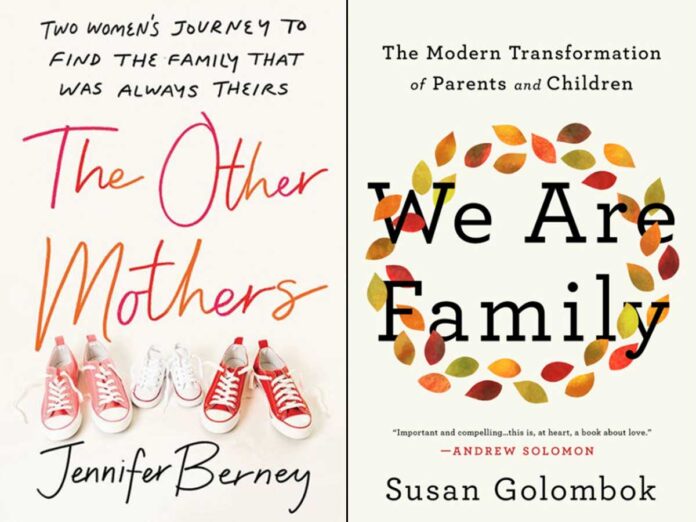
Three new books offer various insight, inspiration, and social science rigor as they chart the contours of queer parents’ lives.
In “The Other Mothers: Two Women’s Journey to Find the Family That Was Always Theirs” (Sourcebooks), Jennifer Berney tells the story of how she and her spouse Kellie became parents despite fertility challenges and a healthcare system not designed for queer families. Berney had always known she wanted kids; Kellie wasn’t so sure. Although they eventually both agreed to move forward, they ran out of reserves from their chosen unknown donor before Berney got pregnant. Yet the medical professionals they saw had no protocols for dealing with lesbian patients, resulting in much lost time before Berney received an effective infertility diagnosis and treatment.
Berney’s story illuminates the need for change within the fertility industry, but is first and foremost a story of relationships, expectations, and building family despite the obstacles. She writes of what led her and Kellie to eventually use a known donor, the ways that fate and kinship tied them to their donor and his family, and how queer people as a whole have reimagined families. Along the way, she educates us about the history of assisted reproduction, the legal hurdles of second-parent adoption, the racist origins of both the international adoption industry and the gynecological speculum, and how the emerging science of epigenetics (how our experiences impact which genes are turned on or off) blurs the lines of nature and nurture, reinforcing a non biological mother’s role.
Berney weaves her story and her broader reflections into a textured and thoughtful narrative. This isn’t the first memoir by a queer woman struggling with infertility (see my database at mombian.com for some others), but it does honor to the genre.
“No Blanks, No Pauses: A Path to Loving Self and Others” (Amplify), by Shelly McNamara, chief equality and inclusion officer at Procter & Gamble, is part memoir and part self-help book, using vignettes from McNamara’s life, told through prose and poems, as a way to encourage readers to find their own paths and “bring more compassion into the world.”
McNamara offers snapshots of difficult or transformative moments in her life: growing up as the youngest of 15 children raised by a single mother; losing family and friends, some very young, to illness and injury; coming out as a lesbian and starting a family; dealing with harassment; and coming out at work. She shares how she found inner strength through self-reflection and writing. At the end of each chapter, she offers questions for readers’ own reflection, like “What do you feel called to do?” “What regrets or wrongs do you carry?” and “Who do you see as less than?”
This is memoir as pedagogy and inspiration. The overall narrative may not feel as seamless as some, but each story and poem within it has a message about loving oneself and others. As McNamara tells us, “I want my story and storytelling to help heal the pain that exists within and between people.”

Susan Golombok’s “We Are Family: The Modern Transformation of Parents and Children” (Public Affairs) sits in a different genre. Golombok, professor of family research and director of the Centre for Family Research at the University of Cambridge, is one of the world’s leading social science researchers on LGBTQ and other non-traditional families. This volume, however, is aimed at a general audience, offering not only Golombok’s learnings from decades of pioneering research but also, more importantly, sharing many of the personal stories behind them.
The book looks at families in the U.K. and U.S., LGBTQ and not, formed with sperm, egg, and embryo donations and through surrogacy. Along with these stories, Golombok relates the history of the assisted reproduction industry and societal responses to it, which were not always positive even for straight cisgender people. She also explores the societal and familial implications of reproductive technologies like egg and embryo freezing, mitochondrial donation, uterus transplants, and even synthetic eggs and sperm.
Golombok’s top-notch reputation is warranted, though I did find one small error in the book. She says that in 2010, lesbian couples “began to have children through shared biological parenting” using one woman’s egg and the other’s womb. My spouse and I had our son this way in 2003, however, and I know we weren’t the first. One point could also use clarification: She refers to Thomas Beatie, who in 2008 “appeared on the ‘Oprah Winfrey Show’ as the world’s first pregnant man.” Golombok then says (rightly, as far as I know) that he was “the first legally recognized man to have a baby,” but fails to note that a number of other transgender men had previously given birth, although they were not legally recognized as men. Still, her discussion of transgender parents bearing, adopting, and raising children is unfailingly positive.
Readers here will not be surprised by the conclusions Golombok has reached again and again in her research — that children in these non-traditional families do just as well as any others — but should appreciate her insights into the similarities and differences among them. She also explores why it is important for children to learn about their origins as early as possible and how social science research has played and must continue to play a role in supporting these families and shaping public policy.
This is a fascinating volume by a luminary in the field, and a worthwhile read for anyone interested in the history and future of LGBTQ families and other diverse family forms.
Dana Rudolph is the founder and publisher of Mombian (mombian.com), a GLAAD Media Award-winning blog and resource directory, with a brand-new database of books and media, for LGBTQ parents.